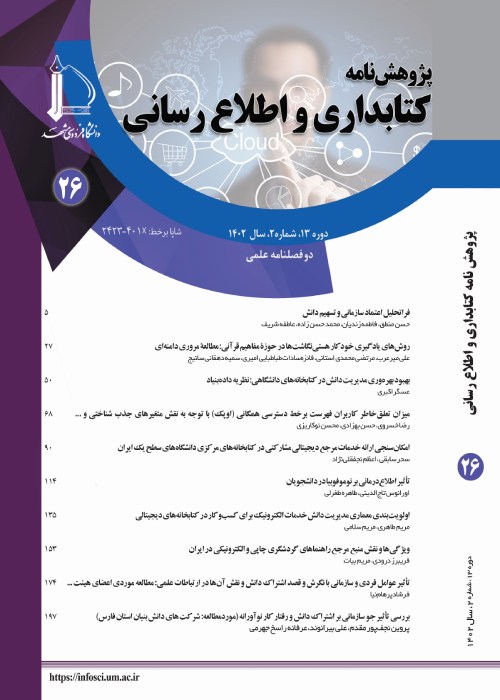The Influence of Individual and Organizational Factors with the Attitude and Intention to Share Knowledge and Their Role in Scholarly Communication: A Case Study of Faculty Members in Western Iran Universities
Knowledge sharing and scholarly communications do not happen in a vacuum. It appears that knowledge sharing and scholarly communication are influenced by individual and organizational factors, which play an important role in the survival of the university. The present study analyzes major factors such as trust, mental norms, organizational culture, and reward system on the attitude and intention of knowledge sharing and on scholarly communication. The researcher investigated how these factors can affect scholarly communication widely by using the mediating role of knowledge sharing. The review of previous studies indicates that the effect of some individual and organizational factors on scholarly communication has been of limited interest to researchers. In addition, no study was found in Iran regarding the mediating role of knowledge sharing on scholarly communication. Furthermore, few studies have been conducted outside of Iran regarding knowledge sharing and scholarly communication. Considering, the importance of individual and organizational factors and the important role that these two variables have in knowledge sharing (attitude and intention to share knowledge), and scholarly communication, this research aims to display the importance of some individual and organizational factors among universities in the west of the country with this approach, the aim of the present study is to investigate the effect of individual and organizational factors on the attitude and intention to share knowledge and its role in scholarly communication among faculty members of universities in the west of the country.
The research method adopted in the study was survey-analytical. The statistical population of the study who were recruited based on simple random sampling method were faculty members of the western universities (in the provinces Kermanshah, Ilam, and Kurdistan) including 270 faculty members. The data collection tool was a questionnaire. In order to ensure the content validity of the study, five experts were asked to pass their judgments on the draft. Cronbach's test was used to determine the reliability of the questionnaire. The results of Cronbach's test showed that the trust component (.75), subjective norms (.84), organizational culture (.80), reward system (.74), knowledge sharing attitude (.91), knowledge sharing intention (.73) and scholarly communication (.87) and a total of 41 questions equal to.74 were obtained, which indicated the appropriate reliability of the scale. According to the quantitative approach in this research, data analysis was done using descriptive statistics (frequency, frequency percentage, skewness, and kurtosis) and inferential statistics, multiple regression test, and structural equation modeling using SPSS and Amos software
The research findings showed that the variable of trust through the attitude of knowledge sharing and the mental variable through the intention to share knowledge affected scholarly communication. The variables of organizational culture and reward system affected scholarly communication only through the attitude of knowledge sharing, and organizational culture only through the intention of knowledge sharing. The variable of mental norms, not only indirectly affected scholarly communication, directly affected scholarly communication. Also, the findings showed that the greatest regression effect related to the trust variable (.394) was on the knowledge sharing attitude. Furthermore, knowledge sharing attitude (.114) had the least regression effect on scholarly communication. The results of structural equations showed that although the CMIN/DF index and RMSEA (Root mean square error of approximation) were not satisfactory, but the other model fit indices, including absolute fit indices, comparative fit indices, and parsimonious fit indices, had a favorable and acceptable status, which shows that the presented model has relatively acceptable.
In general, the results of the research showed that trust, organizational culture, and reward system have an effect on scholarly communication through the mediation of knowledge sharing attitude and knowledge sharing intention. Furthermore, these factors are important elements that determine Knowledge sharing behaviors in higher education. Therefore, the role of these factors in the development of scholarly communication by maintaining the mediating role of knowledge sharing is undeniable, and this can be justified considering that most of the activities of academic staff are individual-oriented and organization-oriented. According to the findings, it is suggested that universities provide an environment that facilitates the knowledge sharing process in order to strengthen the scholarly communication of faculty members. It is also necessary for universities to focus more on people's trust and mental norms in order to create trust, collective cooperation, and social interactions between faculty members in the university. This will have an important effect on scientific development and scientific production.
- حق عضویت دریافتی صرف حمایت از نشریات عضو و نگهداری، تکمیل و توسعه مگیران میشود.
- پرداخت حق اشتراک و دانلود مقالات اجازه بازنشر آن در سایر رسانههای چاپی و دیجیتال را به کاربر نمیدهد.


